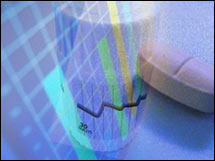|
Stanford bars doctors from taking gifts Dean: move counters conversion of medicine from a 'profession to a business.' NEW YORK (CNN) -- Stanford University Medical Center announced Tuesday it is joining a small group of academic medical centers in banning its physicians from accepting industry gifts of any size, including drug samples. That means no more free meals, free tickets to sporting events, free pens or any of the other myriad freebies showered on doctors by drug companies hoping to boost their sales.
The medical center said in a posting on its Web site that the move is intended to limit the influence of pharmaceutical and other biomedical companies in the medical center's activities. The policy, which is slated to go into effect Oct. 1, applies to the medical center campus and off-site clinical facilities where Stanford doctors practice. Pharmaceutical, bio-device and related industry representatives are to be banned from patient care areas and medical school facilities "except for in-service training on devices and equipment and by appointment only, as well as allowing industry support of educational activities only under well-regulated conditions," the statement said. "We do not want industry dollars to have the potential to influence how we train people or give clinical care, and I think this document sets out ways of minimizing this potential," said Dr. Harry Greenberg, professor of medicine and chairman of the 23-member School of Medicine task force that developed the policy. The industry says it spends $21 billion per year on marketing, which includes not only free meals, drug samples and gifts, but also sponsorship of education programs, according to an article in a January issue of the Journal of the American Medical Association. "These marketing practices have the potential to influence physician practice patterns, including the drugs doctors prescribe," the statement said. "Although the majority of physicians queried in national surveys say they don't believe they personally are swayed by industry tactics, they believe a majority of their peers are." "In recent years we have witnessed an erosion of the public trust in the profession of medicine and even in the value of science," said Dr. Philip Pizzo, dean of the school of medicine. "Part of that is related to the market forces that have increasingly converted medicine from a profession to a business, but a significant factor has also been the perception that physicians and scientists may be accepting gifts and gratuities from industry at the very time that the cost of drugs is skyrocketing." He said it is "essential" that doctors "reclaim the moral high ground and avoid the appearances of conflict of interest." Last year, Yale University approved a similar policy, and this year the Hospital of the University of Pennsylvania followed suit. But Stanford said its policy "is broader than those of its counterparts," since it affects not only drug makers but also devices, biotech, hospital and research equipment and supply industries. The policy also bars faculty from publishing in medical journals articles that have been ghostwritten by industry representatives, and reiterates the current requirement that faculty disclose financial interests in their papers and presentations. Pharmaceutical Research and Manufacturers of America, an industry trade group (members include major drug makers Abbott (Charts), Merck (Charts), Bristol Myers Squibb (Charts), Pfizer (Charts) and Johnson and Johnson (Charts)), did not immediately return a call seeking comment. ------------------------------------------------------ Wal-Mart's get into the health care business |
|

